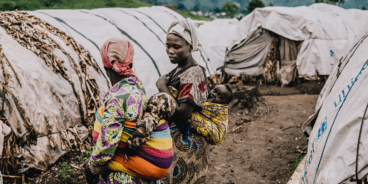
Where’s Canada’s Atrocity Prevention Board?
This article jointly written by Roméo Dallaire, Kyle Matthews and Frank Chalk was originally published in The Ottowa Citizen.
Last week Prime Minister Stephen Harper delivered an important speech at the 2012 National Holocaust Remembrance Day Ceremony at the Canadian War Museum. Discussing the Holocaust, the prime minister stated: “We rededicate ourselves to the promotion of human rights in our own time. We strengthen our resolve to defend the vulnerable, to challenge the aggressor and to confront evil. And we renew our vow: never again.”
South of the border, U.S. President Barack Obama addressed a similar ceremony at the U.S. Holocaust Memorial Museum. The president reminded Americans that: “remembrance without resolve is a hollow gesture. Awareness without action changes nothing. In this sense, ‘never again’ is a challenge to us all — to pause and to look within.”
Both President Obama and Prime Minister Harper reiterated their government’s commitments to combating anti-Semitism and the delegitimizing of Israel, as well as countering Iran’s development of nuclear weapons, but the American president went a vital step farther than his Canadian counterpart.
Referring to the crisis in South Sudan and recent events in Libya, Uganda, Darfur and Côte d’Ivoire, the president unveiled new policies and structures to make genocide prevention a major foreign policy priority of the U.S. government. Key to his strategic policy initiative is Obama’s announcement of an “Atrocities Prevention Board” situated within the White House, an interagency body combining senior officials from the State Department, the Treasury Department, the Department of Defense, Homeland Security and leading intelligence agencies.
Obama’s initiative will resonate throughout the U.S. government, bestowing a new mission on American officials that will soon be fleshed out in a presidential executive order detailing the structure, functions, priorities, and objectives of the board, reports Paul Stares of the Council on Foreign Relations. Unlike the prime minister, the president made a solid commitment, creating a forward looking policy structure that will put the Obama administration on the right side of history.
The president’s initiative to make the United States a leader in preventing and interdicting mass atrocity crimes once more implements recommendations of the Will to Intervene project of the Montreal Institute for Genocide and Human Rights Studies at Concordia University and expert recommendations from the Genocide Prevention Task Force led by former secretary of state Madeleine Albright and secretary of defence William Cohen. The president recognizes that preventing mass atrocities is a “core national security interest as well as a core moral responsibility of the United States,” while Harper has yet to officially recognize the connection between Canada’s national security and mass atrocity prevention. Canada must build its capacity in mass atrocity prevention and civilian protection on three key fronts — diplomacy and mediation; development assistance; and military preparedness. Harper deserves full marks for Canada’s excellent response to the threat of mass atrocities in Libya, but the Libya mission will remain an improvised, “one off” event unless his government delivers an integrated and coherent strategy aimed at preventing mass atrocities and recognizes mass atrocity prevention as a key national interest and security priority of the government of Canada.
Obama invited other nations to share the burden of mass atrocities prevention, declaring this “a global responsibility.” Will Ottawa grasp the president’s hand? Will Harper’s government introduce a policy framework in Ottawa designed to prevent future genocides and crimes against humanity that fully honours the memory of the victims of the Holocaust and other genocides? The prime minister should boldly seize this opportunity to join with the U.S. to make civilian protection and mass atrocity prevention a key part of his legacy.
Related Content


